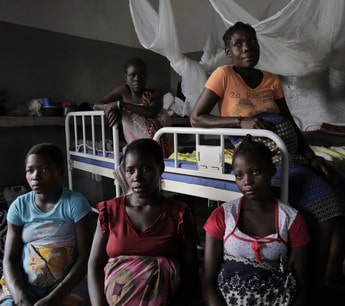Tucked away at the back of the Nhamatanda hospital grounds, sits a small, faded-yellow house. On the wall facing the rest of the hospital is a weathered painting of a pregnant woman sitting on a blanket with a pitcher and glass of water by her side and the words “Casa Mae Espera” or “Expecting Mothers’ House” in arching letters above.
The single-storey building is currently home to 12 pregnant women, all well into their third trimester.
“These women are usually eight months pregnant or more and come from far away communities where they could not easily access the hospital,” explains Denyse Bourgault, a psychosocial support aid worker with the Canadian Red Cross. “These women come here by themselves and often feel a bit lost when they first arrive.”
Two weeks ago, the house had no water, no working bathrooms or shower, no electricity, few beds or mosquito nets and no fans. Then the Red Cross field hospital technicians took interest.
 “We knew a little about the house before, but it was really the techs who got interested in it first,” says Denyse. “When they saw the conditions, they started making improvements right away.”
“We knew a little about the house before, but it was really the techs who got interested in it first,” says Denyse. “When they saw the conditions, they started making improvements right away.”With the help of their team of local labourers, the technicians laid new pipes connecting the expecting mothers’ house with purified water from the field hospital water treatment system. They ran electricity to the house and installed new lights. The bathroom and shower that had sat unused for months without water, were cleaned and reopened. Cleaners were scheduled to come by more frequently and new beds and mosquito nets were supplied from the field hospital’s warehouse.
While the physical changes were being made, Denyse and her assistant, Tabita Fernando, were working on different changes.
“They started making changes to the house and we started making improvements on another level,” says Denyse. “Meaning on a psychosocial level. This was done by visiting the women on a daily basis and trying to enhance their sense of community.”
They did this by having daily gatherings where they would talk, play cards or cook together. After just a few days, the changes in the house were apparent.
“Some of the women said that they were feeling lonely before, but now they are happy,” says Denyse. “They did this by talking to one another, sharing stories and opening up about their fears. When someone new arrives, they welcome them and introduce them to the group. When one of them has a baby, the other women visit her and when they come back it’s a little bit of a celebration around the new baby.”
The women all agree—things are much better now.
“When Denyse and Tabita started coming, everything became better,” says Eva, who often serves as the group’s spokesperson. “We used to have to walk far for water and for the bathroom, but now everything is here. Everything is better, everything is good.”
As time goes by, the women grow more comfortable and open up to Denyse.
“The women approach me to talk to me about some of their fears,” she says. “One woman already lost two children, so she opened up a little about her fears of giving birth after losing two children. It gives them a chance to talk about these things.”
The women have also taken to supporting each other.
“One of the younger ones, a sixteen-year old girl, was having her first baby,” says Denyse. “An older woman who is having her sixth baby started looking out for her. The 16 year-old was obviously afraid and felt very alone, so the woman with more experience would gently, in her own manner, support her and reassure her. And it was nice to see.”
A big part of the success with the house is thanks to Tabita, a community worker who has been working closely with the Red Cross for six weeks.
“Tabita is my voice, but she also has a very strong voice of her own,” says Denyse, laughing. “She is very warm and caring. I really like what she’s talking about with these women. She tells me what they need and, for example, there was an argument between the women at some point and Tabita just dealt with it really well. They ended up resolving it like a family would. She is very precious.”
While the house is only a temporary stop for these women, the community they have created is a home away from home.
So much so, that one of the women jokes that she wants to stay and raise her child in the house rather than go back home.
The field hospital is made possible with the generous support of donors and the Government of Canada.
Related stories:
Meet the Mozambique translators
Making the invisible, visible: Advancing women's health leadership in humanitarian environments
Mozambique field hospital opens specialized malaria treatment centre
You can help those affected by making a donation to the Canadian Red Cross Cyclone Idai Appeal online.

